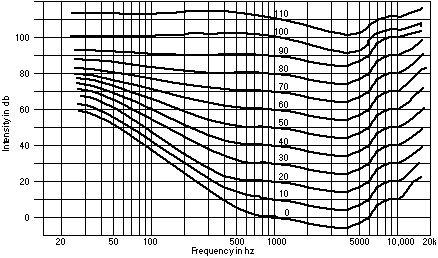Difference between revisions of "Equal Loudness"
(first ed.) |
m |
||
| Line 1: | Line 1: | ||
| − | + | Equal Loudness Curves<ref>also known as [[Fletcher Munson]] curves</ref> | |
[[Image:EqualLoudness.gif|Equal Loudness Curves|right]] | [[Image:EqualLoudness.gif|Equal Loudness Curves|right]] | ||
Revision as of 04:18, 23 August 2006
Equal Loudness Curves[1]
"You will see lots of references to equal loudness curves or equal loudness contours- these are based on the work of Fletcher and Munson at Bell labs in the 30s, or perhaps refinements made more recently by Robinson and Dadson. These were made by asking people to judge when pure tones of two different frequencies were the same loudness. This is a very difficult judgment to make, and the curves are the average results from many subjects, so they should be considered general indicators rather than a prescription as to what a single individual might hear" - Numbers and Initials of Acoustics
See also:
http://www.sfu.ca/sonic-studio/handbook/Equal_Loudness_Contours.html
http://hyperphysics.phy-astr.gsu.edu/hbase/sound/eqloud.html
Preset Version 2.0 #57 applies an effect similar to this.
- ↑ also known as Fletcher Munson curves
